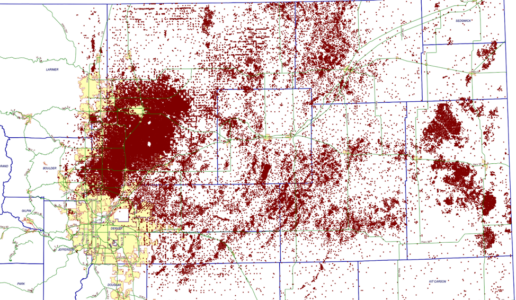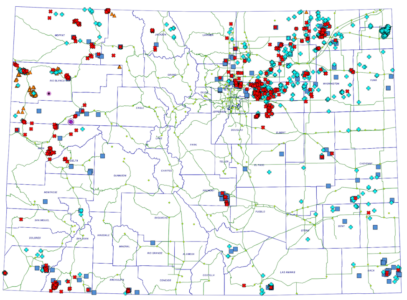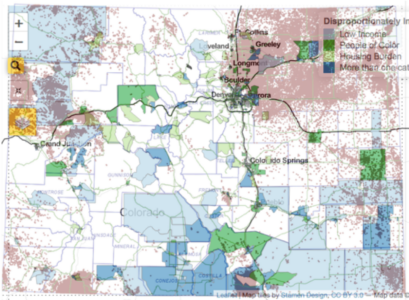PRESS RELEASE
Colorado legislators introduce bill to phase out new oil and gas permits and require operators to fund cleanup
SB 24-159 would advance climate action and protect public health and taxpayers
DENVER, Colo. — Colorado State Senators Sonya Jaquez Lewis (D-Lafayette) and Kevin Priola (D-Henderson) introduced legislation Tuesday to stop new oil and gas permits from being issued in Colorado by 2030. The bill does not ban existing operations or set limits on production. The bill would also increase the proportion of clean-up costs paid by operators rather than taxpayers for oil and gas wells, carbon capture and sequestration, and geothermal facilities.
If passed, Colorado would be the first top-five U.S. oil-producing state to set an expiration date for new oil and gas permits. Denmark, is one of eight countries that have already put an end to new oil and gas development. Denmark, one of the largest oil and gas producers in Europe, has gone further, joining France and Spain in setting an end date for oil and gas production in their nations and all territories by 2050 at the latest. In the US, New York, Vermont and Maryland have all banned fracking, a type of oil and gas production, in 2015. California is on track to fulfill the governor’s 2021 commitment to stop permitting fracking in the state by 2024, and its Air Resource Board recommended limiting all oil and gas production to only in-state demand by 2040, the year they have set as their net-zero greenhouse gas emissions target. Under SB 24-159, Colorado will continue to have more than enough oil and gas for in-state demand: existing wells, which produce nearly 4 times the natural gas and twice the oil Colorado uses, will continue producing for decades.
“I think most Coloradans agree with us that we can’t keep drilling forever. It’s a finite energy source. Fossil fuel demand is going down in Colorado because we are starting to transition to clean energy,” said Democratic Sen. Sonya Jaquez Lewis of Lafayette, a sponsor of SB24-159. “There are going to be thousands of wells producing well after 2050. No one at all is trying to halt oil and gas production.”
In phasing out new oil and gas permits by 2030, the bill would prioritize permitting reductions in disproportionately impacted communities. It would also phase out modifications to old wells such as redrilling and deepening, and it would ensure that permits for un-drilled wells expire by 2033. The bill requires follow-up on the study determining how to support a just transition of oil and gas workers and communities put in place by HB23-1074.
Additionally SB 24-159 reforms the Oil and Gas Conservation Act to hold all prior operators of orphaned wells financially liable for clean-up. The bill updates liability provisions of the Act to include new ECMC-regulated technologies including carbon capture and geothermal. This liability reform would allow the state to recover costs from any or all prior operators (but not land or mineral owners), ensuring faster cleanup of orphan wells. By increasing the revenue available to fund cleanup efforts – collecting from operators who profited from the mess – this bill protects both public health and the climate, and allows the land around these old wells to be used for other purposes.
For decades, oil and gas operators escaped clean-up costs by transferring dead and dying oil wells to smaller operators who couldn’t afford cleanup, which often led to orphanage. The Colorado Legislature and the federal government, through the Inflation Reduction Act, have both appropriated tens of millions of taxpayer dollars to plug and remediate these wells and spills. Without the kind of reform set forth by SB 24-159, orphan wells and historical contamination will cost the taxpayers and future generations hundreds of millions more long into the future.
The oil and gas industry in Colorado puts millions of Coloradans at risk for health impacts and substantially contributes to the carbon pollution exacerbating climate change. Continuing to issue new permits and drill new or deeper wells which will pollute for decades is counter to international climate agreements and undermines recommendations to end new fossil fuel production. Because production of oil and gas in Colorado far exceeds demand and existing wells will continue to produce, SB24-159, requiring a phase out of new permits, will not impact Colorado’s energy needs, but it will honor the state’s statutory commitments to address climate change, pollution, and environmental justice, as enacted by HB19-1261, HB21-1266, and SB23-016.
“Oil and gas emissions are negatively impacting public health,” says Jaquez Lewis. “This legislation makes sure that Colorado takes strong action to reduce greenhouse gas emissions by putting a definite end date on new well permits so we can work towards a sustainable energy future”
Background
Oil and gas companies have drilled 120,000 wells in Colorado since the early 1900s, and the industry is the top contributor to ozone formation and to greenhouse gas emissions in the state. Nearly 50,000 wells are active, producing roughly 4 times more gas and twice as much oil as in-state energy use while thousands of wells have been orphaned or are at high risk of becoming orphaned (See Fig. 1–3 below for maps). Orphaned wells cost the state almost $100,000 per well, on average. Many cost a lot more.
Oil and gas production is one of the biggest hazards to public health in Colorado, both directly from pollution and by contributing to climate change. Low income communities and people of color are impacted disproportionately. Ground level ozone caused largely by oil and gas pollution causes heart and lung disease, premature death, childhood asthma, and scarring of healthy lung tissue, with nearly four million Coloradans living in “severe” ozone areas. In addition, almost 300,000 Coloradans live within ½ mile of oil and gas wells and facilities and many have reported impacts including cardiac, respiratory, neurological and gastrointestinal problems, anxiety, and sleep disturbance to the CDPHE, known impacts of oil and gas wells that have also been shown in peer-reviewed studies Even after plugging, wells put communities at risk: well plugs regularly fail, again polluting the land, water and air in communities.
Climate change has been declared the greatest global threat to public health by 200 medical journals, and in Colorado, impacts such as extreme heat, drought, flooding and wildfires are expected to increase. COP28 countries unanimously agreed we need to transition away from fossil fuels, with 128 countries calling for a phase out, and science-based assessments show that an end to new fossil fuel development is needed for a 50% chance of limiting global warming to 1.5ºC.
See quote deck below the figures.

Fig. 1. Oil and gas wells in northeast Colorado (cities highlighted in yellow, Denver near bottom left)

Fig. 2. Current orphan wells in Colorado

Fig 3: Wells layered with map of disproportionately impacted communities. Sources: ECMC interactive map, and CDPHE Enviroscreen map (2022 version)
###
Quote deck:
“Operators passed old, dead, and dying oil and gas wells around like hot potatoes. Each well costs Colorado nearly $100,000 to plug and remediate, on average. Many cost a lot more. No one has the right to profit for years and then dump all the costs on the public. Our communities shouldn’t have to put up with dead oil wells for years while they wait for taxpayers to put up money to plug them. The state needs to make sure the oil and gas industry takes responsibility for the messes they left behind. These wells leak methane and burden communities and the environment with toxic air pollution, they can contaminate water and sicken and poison wildlife. Even after plugging many wells still need to be replugged, often years later.”
– Kate Merlin, WildEarth Guardians
“Later is too late to prevent new oil and gas development from endangering our planetary ecosystems, and every year more and more Coloradans end their use of gasoline and methane. We don’t need any more fracking to maintain and protect our Colorado way of life. And we refuse to let the polluters shove their cleanup costs onto the citizens of this great state. They’ve done enough damage. No more.”
– Jan Rose, Spokesperson, Colorado Coalition for a Livable Climate.
“Colorado communities get the pollution while oil and gas companies profit off shipping most of their product out of state. The industry engages in deliberate fear mongering, stoking unfounded concerns about energy supply for Coloradans – the reality is that for decades current wells will continue producing more than we need. We applaud the courage of the bill sponsors and urge all Colorado lawmakers and the Governor to stand with them in saying no to this destructive industry, and lighting the path for other states.”
– Heidi Leathwood, Climate Policy Analyst, 350 Colorado
“Injustice is when some breathe in profit, while others breathe in pollutants. Let’s fuel change by shedding light on the shadows of environmental inequality. Meaning that we can make a difference by making a change starting now! The big cost doesn’t seem to hurt the operators like it does impacted communities who are really left holding the bag, like it affects the dirty dogs making the profit and by now we all know there is no money in being the good guy, but just know that, no one is safe, we are all at risk. Join the good guys by raising awareness and advocating for justice. All we want is to create a more equitable and sustainable future for everyone.”
– Nikie Wells, Environmental Justice Director, Black Parents United Foundation
“Despite years of carefully crafted legislation and intensive stakeholding, concessions to industry have meant that Colorado still hasn’t managed to bring our air quality in line with federal standards, hasn’t been able to adequately protect the public from the toxic pollutants released from drill sites, and hasn’t sheltered homeowners and taxpayers from the fallout of this boom-and-bust industry. Oil and gas development scars our landscapes, pollutes our air and water, and harms the health of the communities where it occurs. Enough is enough, and it’s time that we stop tweaking around the margins of policy and begin to truly address the root cause of these issues.”
– Jared Bynum, Climate Justice Policy Coordinator, Colorado Rising
“As a father, a community leader, and a former elected official, it is my privilege and duty to advocate for those residents disproportionately impacted by unconventional oil & gas exploration. We can no longer accept vague future promises of fossil fuel divestment; the climate emergency is real. Immediate, concrete action is required. The first step is to stop making the problem worse; every newly drilled well extends the timeline to a fossil-free future by 30 years or more. We must also hold this industry responsible for their true cumulative impact with regard to greenhouse gas emissions (including those generated by international exports), the eventual plugging and abandonment of the 50,000+ active wells in Colorado, and the leaks and spills that will plague our communities for decades. At the same time, we must ensure a just and equitable transition to other industries for the oil & gas industry workers that have given so much. Our house is on fire; it is well past the time to act.”
– Christiaan van Woudenberg, Founder, Erie Protectors
“Colorado has been an oil and gas state since the beginning, harming generations, with no enforceable protections to our future generations’ health and safety. Enough enabling a predatory industry addicted to profits, that bullies our communities and resources, abusing state laws to break our regulatory systems further sacrificing human rights and environmental degradation with cumulative impacts of pollution, for only the economic gain of a few. Disproportionately impacted communities did not create themselves but we do deserve the right to fight back with a just transition for workforce development, safe sustainable industries, and trauma sensitive healthcare. Our goal should not only be to phase out toxic industries but learn from the harms they created to not repeat them. The data to recognize and act from knowing the disparities to communities is already proven, now state legislation has the responsibility to protect and maintain enforcement for long term restoration and equity analysis, so industry is not allowed to prey on our communities and Biosphere again.”
– Renée M. Chacon, Co Founder of Womxn from the Mountain, EJ Action Task Force member Co Commissioner of EECIA, Commerce City Council Womxn for Ward 3.
When I thought about where I would raise my son, I wanted him to have a childhood like I did in Colorado. Instead, I have had to learn about the health impacts of oil and gas, air quality monitoring methodology, and how to navigate a bureaucratic system that was made to keep out people like me. I am proud to stand with the legislators that have had the courage to take on the oil and gas industry and their influence at the Capitol. This phase out gives us time to plan and prepare for a fossil free future. I hope that Governor Polis will finally fulfill his first campaign promise to be bold and his second to move us forward. Nuestra comunidad – our community – has been asking for justice for decades, we cannot knowingly keep taking from our future generations.
– Patricia Garcia-Nelson, Fossil Fuel Just Transition Advocate, GreenLatinos Colorado
We are careening towards 1.5C of warming, the threshold for avoiding the most dangerous climate outcomes. We are at a true crisis inflection point and can’t continue kicking the can down the road with business as usual practices. This is courageous legislation for this moment. It ensures that fossil fuels stay in the ground and that fracking sites don’t continue to degrade our water and soil. In Judaism, we place great value on maintaining our tradition l’dor v’dor, from generation to generation. Later is too late! We have a responsibility to act now so that our children and grandchildren can live and thrive on our beautiful, life-sustaining earth.
– Moshe Kornfeld, Executive Director, Colorado Jewish Climate Action
“Western Colorado is a climate hotspot, warming disproportionately compared to the rest of the State and the country. We have seen some of the most extreme warming in the country, and our rare and irreplaceable ecosystems under increasing climate and ecological stress. The majority of the State’s water supply comes from the Colorado River Basin on the Western Slope and that water supply is rapidly shrinking. While adaptation measures are important, tackling the cause behind extreme weather leading to intensified wildfire, extreme drought, massive flooding, landslides and rockslides, collapsing infrastructure, and increased risks to public health, safety, and the environment are imperative, and the sign of brave and courageous leaders.”
– Natasha Léger, Executive Director, Citizens for a Healthy Community
We know that we must reduce climate pollution immediately if we are going to preserve a safe and healthy environment. As a millennial and a mom, I want a stable natural environment that my kids and I can enjoy in our lifetimes just as much as my parents and grandparents did in theirs. Keeping fossil fuels in the ground is a critical step. That means the fossil fuel companies need to stop drilling new oil and gas wells, and they need to close up and clean up the many thousands of wells in Colorado that can continue to leak climate pollution into the air we breathe. This is a time for everyone at every level to do everything that they can to stop climate change. And this bill is Colorado’s opportunity to set a strong example – to move away from the polluting energy sources of the past and make way for the modern green economy that this and future generations of Coloradans deserve.
– Bobbie Mooney, Beyond Oil & Gas Campaign Coordinator, 350 Colorado
“The phase out of new O&G permits by 2030 fits in well with our goal of making Colorado carbon neutral by 2050. O&G extraction is not being banned. O&G extraction will begin to taper down after 2032 as the about 50k wells in Colorado become depleted. Given the average life of a vehicle of 20 years and the average life of a gas furnace of 18 years, this works out about right. This is also an important step in solving our ground level ozone crisis.“
– Paul Culnan, Senior Policy Analyst for Empower Our Future
“Oil and gas development continues to be a leading cause of devastating climate change and air pollution that is harming us right now in Colorado. We need urgent action to end our dependence on dirty sources of fuel and to protect workers as we transition to clean energy. We also need to ensure that the corporations that have extracted so much profit from these wells remain responsible for cleaning them up and aren’t able to burden our communities with those costs.”
– Ramesh Bhatt, Chair, Colorado Sierra Club Conservation Committee
